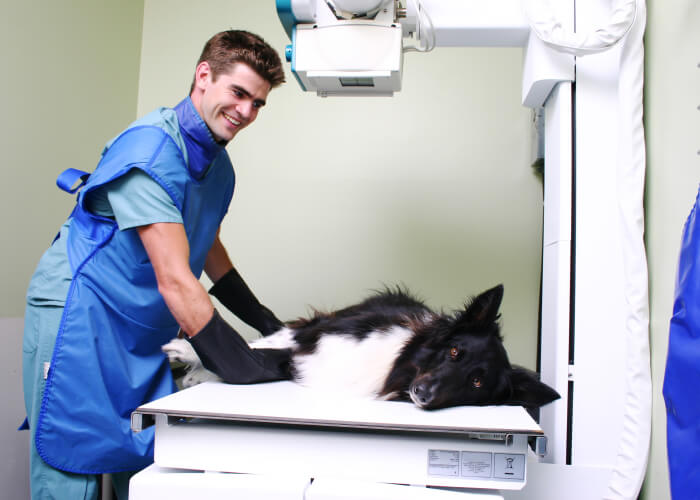Overview of Spleen Tumours in Dogs
Spleen tumours, also known as spleen cancer in dogs, represent a critical health issue affecting canines of any breed or age, though they are more commonly observed in older dogs. These tumours can be classified as benign (non-cancerous) or malignant (cancerous), with each type posing different levels of risk to your pet’s health. Regardless of the type, spleen tumours in dogs necessitate prompt veterinary evaluation and intervention to manage the condition effectively and prevent potential health complications.
The spleen plays a vital role in your dog’s immune response and blood filtration, making tumours in this organ particularly concerning. Spleen tumours in dogs can compromise these essential functions, leading to significant health challenges. Effective management of these tumours is critical and often involves a combination of diagnostic and treatment strategies tailored to the patient’s specific needs.
As part of our vet services, the Bayside Vets team is prepared to assist your furry friend in the journey to recovery.
Identifying Symptoms of Spleen Tumours
Timely identification of dog spleen tumour symptoms can dramatically improve the management and outcomes of this condition. Key symptoms include:
- Noticeable weight loss and decreased appetite
- Visible distention in the belly
- Episodes of sudden weakness or fainting
- Changes in behaviour indicating discomfort or pain
Immediate consultation with our veterinary experts is advised if your dog exhibits these symptoms.

Diagnostic Process and Spleen Removal In Dogs
Our veterinary team uses state-of-the-art diagnostic tools to confirm the presence of a spleen tumour. Spleen removal in dogs, technically a splenectomy, is often recommended if diagnosed.
Conducting Splenectomy in Dogs
The procedure for spleen removal, or splenectomy in dogs, starts with general anesthesia to ensure comfort and pain-free conditions during surgery. Our veterinary surgeons then make an incision in the abdomen to access and carefully remove the spleen, taking care to seal or suture the blood vessels to prevent bleeding.
Once removed, the spleen is examined to determine if the tumour is benign or malignant, guiding further treatment options. This critical evaluation helps manage your dog’s health effectively, offering a clearer prognosis and facilitating a recovery plan to enhance your pet’s quality of life post-surgery.
Post-Operative Care and Healing of Dog Spleen Surgery
Post-surgical care is crucial for recovery from spleen removal. We provide comprehensive support, including:
- Administration of pain relief medications and antibiotics
- Instructions for home care that include rest and gradual reintroduction to activity
- Scheduled revisits for post-operative assessments and ongoing monitoring
Adhering to our post-surgery guidelines facilitates a smooth recovery from splenectomy for your pet.
Prognosis and Continued Health Management
The prognosis after spleen removal varies, mainly depending on whether the tumour is cancerous and if it has metastasised. Without surgery, the life expectancy of a dog with a spleen tumour is generally reduced, making early surgical intervention vital.
Additional Treatments for Spleen Cancer in Dogs
When a spleen tumour in dogs is diagnosed as malignant, additional treatment beyond surgery may be necessary to manage the disease effectively. These treatments are designed to combat the spread of spleen cancer in dogs and maintain your pet’s highest quality of life.
- Chemotherapy: Utilizing specific anti-cancer drugs to target and kill cancer cells, which can be crucial in cases where the cancer has the potential to spread beyond the spleen.
- Radiation Therapy: Occasionally recommended to target residual cancer cells, particularly in areas that are difficult to address through surgery alone.
- Immunotherapy: Emerging treatments that help boost the immune system’s ability to fight cancer.
- Supportive Care: Includes pain management, nutritional support, and other supportive therapies to help your pet feel more comfortable and improve overall well-being during treatment.
Book Your Consultation Now
Taking prompt action is essential when a spleen tumour is suspected in your dog, as early detection significantly enhances treatment effectiveness and prognosis. Bayside Vets provides a thorough evaluation using advanced diagnostics, creates customised treatment plans tailored to your dog’s specific needs, and maintains clear communication throughout the treatment process.
Our clinic is committed to compassionate care, treating every pet empathetically and professionally. If you’re concerned about your dog’s health, contact us immediately to schedule an expert evaluation and ensure your dog receives early and effective treatment.